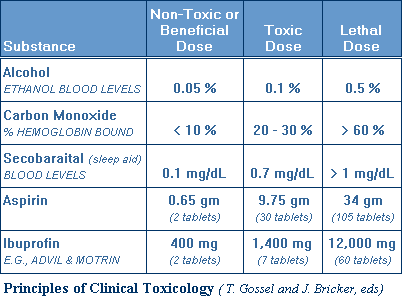|
 |
 |
 |
 |
|
|
|






What is Toxicology?

The traditional definition of toxicology is "the science of poisons." As our understanding of how various agents can cause harm to humans and other organisms, a more descriptive definition of toxicology is "the study of the adverse effects of chemicals or physical agents on living organisms".
These adverse effects may occur in many forms, ranging from immediate death to subtle changes not realized until months or years later. They may occur at various levels within the body, such as an organ, a type of cell, or a specific biochemical. Knowledge of how toxic agents damage the body has progressed along with medical knowledge. It is now known that various observable changes in
anatomy or body functions actually result from previously unrecognized changes in specific biochemicals in the body.
The historical development of toxicology began with early cave dwellers who recognized poisonous plants and animals and used their extracts for hunting or in warfare. By 1500 BC, written recordings indicated that hemlock, opium, arrow poisons, and certain metals were used to poison enemies or for state executions.
With time, poisons became widely used and with great sophistication. Notable poisoning victims include Socrates, Cleopatra, and Claudius. By the time of the Renaissance and Age of Enlightenment, certain concepts fundamental to toxicology began to take shape. Noteworthy in this regard were the studies of Paracelsus (~1500AD) and Orfila (~1800 AD).
Paracelsus determined that specific chemicals were actually responsible for the toxicity of a plant or animal poison. He also documented that the body's response to those chemicals depended on the dose received. His studies revealed that small doses of a substance might be harmless or beneficial whereas larger doses could be toxic. This is now known as the dose-response relationship, a major concept of toxicology. Paracelsus is often quoted for his statement: "All substances are poisons; there is none which is not a poison. The right dose differentiates a poison and a remedy."
Orfila, a Spanish physician, is often referred to as the founder of toxicology. It was Orfila who first prepared a systematic correlation between the chemical and biological properties of poisons of the time. He demonstrated effects of poisons on specific organs by analyzing autopsy materials for poisons and their associated tissue damage.
The 20th century is marked by an advanced level of understanding of toxicology. DNA (the molecule of life) and various biochemicals that maintain body functions were discovered. Our level of knowledge of toxic effects on organs and cells is now being revealed at the molecular level. It is recognized that virtually all toxic effects are caused by changes in specific cellular molecules and biochemicals.
Xenobiotic is the general term that is used for a foreign substance taken into the body. It is derived from the Greek term xeno which means "foreigner." Xenobiotics may produce beneficial effects (such as a pharmaceuticals) or they may be toxic (such as lead).
As Paracelsus proposed centuries ago, dose differentiates whether a substance will be a remedy or a poison. A xenobiotic in small amounts may be non-toxic and even beneficial but when the dose is increased, toxic and lethal effects may result.
Some examples that illustrate this concept are:

The development of this course was based on the concepts presented in the University of Maryland's introductory course on toxicology, Essentials of Toxicology. These basic principles of toxicology are similar to those taught in other major university programs and are well described in the literature. The volume of literature and textbooks pertaining to toxicology is quite extensive and a listing of all the excellent textbooks is beyond the scope of this tutorial.
While other references were selectively used, the textbooks listed below have served as the primary resources for this tutorial. They are quite comprehensive and among those texts widely used in basic toxicology training courses.
 |
 |
| Casarett and Doull's Toxicology
|
| (C. Klaassen, M. Amdur, and J. Doull, eds.)
|
|
|
| Principles and Methods of Toxicology
|
| (A. W. Hayes, ed.)
|
|
|
| Basic Environmental Toxicology
|
| (L. Cockerham and B. Shane, eds.)
|
|
|
| Industrial Toxicology
|
| (P. Williams and J. Burson, eds.)
|

  
|
|
|
|